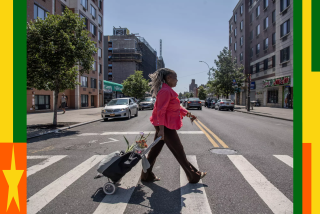Israel to Complete Lebanon Pullout by Weekend
- Share via
JERUSALEM — Israel’s army chief said Tuesday that he expected to pull his troops out of Lebanon by the weekend, which would meet a key requirement of the cease-fire that halted a 34-day war against Hezbollah guerrillas.
The withdrawal would complete the transfer of security responsibilities along Lebanon’s southern border to the Lebanese army and a beefed-up United Nations peacekeeping force that has been deploying in the area.
Israel invaded Lebanon on July 12 after guerrillas in the Islamic militant group crossed the border and killed three Israeli soldiers and seized two others.
Since the U.N.-brokered cease-fire took effect Aug. 14, Israel has maintained a limited presence in Lebanon, seeking assurances that the peacekeeping force was strong enough to secure the border and prevent Hezbollah from rearming.
Israel’s army chief, Lt. Gen. Dan Halutz, told parliament’s Foreign Affairs and Defense Committee that conditions appeared ripe for the final pullout by sundown Friday -- the start of the Jewish New Year, committee member Ran Cohen said.
Israeli security officials confirmed the Friday pullout target. They requested anonymity because they were not authorized to speak to the media.
At the height of the fighting, Israel had about 30,000 troops in Lebanon. The army refused to say how many troops remained, but Cohen estimated the figure at several thousand. Most are thought to be concentrated in three areas along the border.
The United Nations urged Israel on Tuesday to hand over detailed information about cluster munitions it used in Lebanon, saying at least 350,000 unexploded devices posed a deadly risk.
In villages in southern Lebanon, experts are removing undetonated small bombs from houses, yards and fields. On a recent day, villagers looked on warily as Tony Wyles, part of a U.N. team, inspected a small cluster bomb at the foot of a fig tree.
“Every bomb is a challenge. You don’t know why it didn’t explode.... The slightest movement can trigger it,” Wyles said as he carefully picked up the bomb, a metal cylinder half the size of a soda can that could kill anyone within 60 feet.
Israeli government spokeswoman Miri Eisin said she was unaware of any official U.N. complaint or request for further details on the weapons.
At least 15 people, including a child, have been killed by cluster bombs in the month since the cease-fire, the U.N. said Tuesday. Eighty-three more have been wounded.
More to Read
Sign up for Essential California
The most important California stories and recommendations in your inbox every morning.
You may occasionally receive promotional content from the Los Angeles Times.













